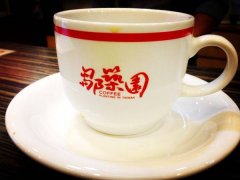Chinese millennials love coffee more than tea, Nestl é and Starbucks are optimistic about growth potential.
For professional baristas, please follow the coffee workshop (Wechat official account cafe_style)
Although Chinese people are traditionally used to drinking tea, more and more young millennials go to coffee shops rather than teahouses, thinking it is more comfortable. Large coffee chains, including Starbucks (SBUX-US), have noticed this change in consumption trends.
According to data from the International Coffee Organization, China's coffee market grew several times faster than the global average in the decade from 2004 to 2014, with the growth of the middle class and income, according to Bloomberg.
In China, the retail consumption of tea is still more than 10 times that of coffee, but if you look at the expansion experience of the coffee market in Japan, this distance will soon shrink. Japan became the fourth largest coffee consumer in the world in the 2000s.

Coffee consumption in China has grown to 18% a year (chart from Bloomberg)
Joseph Reiner, head of coffee at Cofco International, said China's growth curve in the first 10 years of 2014 was very similar to that of Japan between 1963 and 1973. In the past, they only drank tea, but now they will see the Starbucks effect.
According to Euromonitor International Ltd. According to statistics, the current Chinese coffee market is about 1.1 billion US dollars, which is dominated by Nestle SA and accounts for 66 per cent of the market. They are optimistic about local consumption prospects and expect China to become one of the world's major coffee consumers.
Although the consumption of coffee in China is only a fraction of that in the United States and less than half that in Japan, the growth potential is particularly striking. That's why, in order to help expand in China, Chinese mainland announced last month that it would buy a 50% stake in Unified Group for $1.3 billion, taking full control of the 1300 stores in East China, and plans to increase the number of stores in Starbucks to more than 5000 by 2021.
Starbucks CEO Kevin Johnson said that the East China model is enough to bring development over the next 20 years, and they are prepared to operate for a long time.
Important Notice :
前街咖啡 FrontStreet Coffee has moved to new addredd:
FrontStreet Coffee Address: 315,Donghua East Road,GuangZhou
Tel:020 38364473
- Prev

Wearing a coffee coat, you are such a broth!
Professional baristas follow the Coffee Workshop (Wechat official account cafe_style) in the United States, there is such a store: they sell big bone soup in coffee cups, which is unexpectedly popular, with queues at the door selling at least hundreds of cups a day, and even launched a cookbook on big bone soup in 2015. And caused businesses all over the world to follow suit. How did they do it?
- Next

Zou Zhuyuan-the super fierce manor of Leye Village, which has countless champions in Taiwan's coffee industry.
Professional barista exchange please follow coffee workshop (Wechat official account cafe_style) Zou Zhuyuan-Chiayi Le Ye Village Business hours: 08:00 18:00 Latte Index: 250 yuan (only single black coffee) OOO recommendation Index ★★★★☆ Wireless Network ★★★★☆ with power outlet ★☆☆☆☆ without overall space ★★★★☆ spacious celibate and friendly
Related
- Unexpected! Ruixing Telunsu lattes use a smoothie machine to foam milk?!
- % Arabia's first store in Henan opens into the village?! Netizen: Thought it was P's
- Does an authentic standard mocha coffee recipe use chocolate sauce or powder? Mocha Latte/Dirty Coffee/Salty Mocha Coffee Recipe Share!
- What is the difference between Vietnam egg coffee and Norway egg coffee? Hand-brewed single product coffee filter paper filter cloth filter flat solution!
- What is the difference between sun-cured and honey-treated coffee? What are the differences in the flavor characteristics of sun-honey coffee?
- How to make Italian latte! How much milk does a standard latte use/what should the ratio of coffee to milk be?
- How to make butter American/butter latte/butter Dirty coffee? Is hand-brewed coffee good with butter?
- Is Dirty the cold version of Australian White? What is the difference between dirty coffee/decent coffee and Australian white espresso?
- Relationship between brewing time and coffee extraction parameters How to make the brewing time fall to 2 minutes?
- Got entangled?! Lucky opens a new store, Mixue Ice City, and pursues it as a neighbor!

